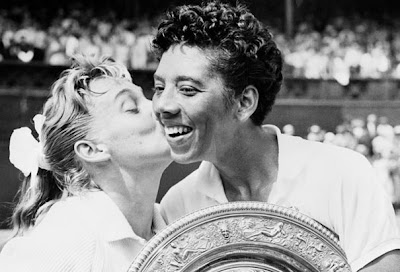Appalling racial discrimination didn't stop Althea Gibson from becoming the first African-American to win a Grand Slam in 1956. 

===
It's never easy to contemplate insufferable injustice, which is why I shudder to think of tennis before Althea Gibson. To think that just over 60 years ago America was encased in an ignorant bubble of seething racial contempt is beyond surreal. And yet, even to this day, we live in a world where people still can't seem to get beyond their puerile obsessions with race, religion, or sexual or political orientation.
It is one of life's most maddening mysteries.
Still, true spirits trudge on, and even in the face of brutal oppression, they seek to enlighten.
Thankfully, in the late 1940's and early 1950's America was on the cusp of enlightenment. Its populace was heedlessly defiant, but slowly becoming aware of the errors of their ways. Still, it needed a reason to believe, because all the obvious reasons hadn't been good enough to eradicate the societal cancer that had stifled the country. The civil rights movement needed forces to be reckoned with, and Althea Gibson -- whether she intended to be or not -- was one of those forces.
But, as immense as her burgeoning talent was, Gibson was no natural messiah. She would need to be spirited.
Alice Marble was one such spiriter, and she had the courage to stand up for what was right. In 1950, after several years of watching the USLTA deny Althea Gibson the opportunity to play in the U.S. National Championships (and all other USLTA tournaments) based on her race, Marble penned a vehement editorial that was published in the American Lawn Tennis Magazine in July, 1950.
In it, Marble stated that if Gibson was denied the right to compete in the U.S. National Championships "then there is an ineradicable mark against a game to which I have devoted most of my life, and I would be bitterly ashamed."
By the end of the summer, the 23-year-old Gibson would become the first African-American player, man or woman, to compete in a Grand Slam tournament.
Gibson had come a long way from her early days in Harlem, where she first took up tennis, to her formative years in the south where she honed her game (and finished her education) under the tutelage of Dr. Hubert Eaton and Dr. Robert Walter Johnson. In addition to learning the finer points of tennis, education, and etiquette, Gibson had to endure learning the finer points of living in the segregated south where degradation was more commonplace than goodwill.
It's easy to get bogged down in the facts -- where Gibson played, who taught her, what titles she won, and when she won her first Grand Slam -- and lose sight of the ethereal eloquence of Gibson's journey. But the true magic in her game, like the true blessings of freedom, should never be forgotten.
Those who love the game of tennis have always seen it as the ultimate metaphor for life, and in the case of Gibson's ascent in the 1950's this axiom was never more apparent. When one athlete can help to reverse a misguided mindset, we realize quickly that sports can be larger than life.
That is the power that Althea Gibson wielded, and with each winning stroke, eyes opened. Gibson believed herself to be apolitical, and while she was a believer in the civil rights movement, she was not interested in carrying a banner for the cause. She was less concerned with fashioning her god-given talent into an agent of change, and more concerned with winning tennis matches.
She did just that, and decisively. After taking several years to fully develop her skills, Gibson became the hands-down best female player in the world from 1956 to 1958. She became the first African-American woman to win a Grand Slam in 1956 when she won the French Open, then in 1957 she became the first African-American woman to win Wimbledon and the U.S. Open. She would repeat her Wimbledon and U.S. Open titles in 1958, and she added six Grand Slam doubles titles by the end of 1958 as well.
Althea Gibson was an elixir for racism in tennis, America, and the world beyond. She was a necessary tonic that served to temper racial oppression in the middle of the 20th century.
How Americans could have fostered a such an antagonistic social climate in the first place, god only knew. But thanks to Gibson's exploits, the tide that had already begun to turn with Jackie Robinson's shattering of baseball's color barrier in 1947 had now flowed through tennis.
With her tall frame, easy power, and fierce competitive fire, Althea Gibson blessed the tennis world with her singular abilities on the court. Her goddess-like body was the perfect vehicle to inspire her faithful advocates to carry the vision of equality to the doorsteps of the oblivious.
Gibson, meanwhile, kept it simple. She did what any great tennis champion learns to do. She didn't overthink things -- she just played.
She played her way into the International Tennis Hall of Fame in 1971, and the world became enlightened in the process.
I had no idea who she was. Thanks for this.
ReplyDeleteChris,
ReplyDeleteThanks for writing this piece, and for the reminder of how far tennis has come. I do know that Althea Gibson and Angela Buxton had formed a friendship as a result of feelings of isolation and discrimination (one Jewish, the other African American). The two went on to win the French Open and Wimbledon doubles title together.
I'm hoping that when they renovate the stadiums at the US Open, organizers will consider naming one of them Althea Gibson stadium, given that she was an American, and won the singles title twice.
Paula and Mitch
ReplyDeleteThx -- Maybe we should choose this for our next book club meeting? Althea's autobiography, from 1958.
http://www.amazon.com/I-Always-Wanted-Be-Somebody/dp/0060115157
Awesome! Keep up the good work, posting about the sociocultural issues underpinning the game!
ReplyDelete